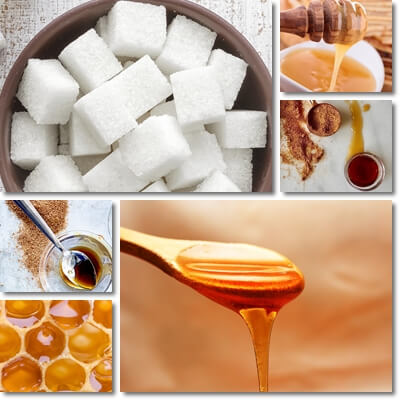For anyone out there fearing sugar and its side effects and relying on honey as a healthier sugar substitute, know that honey isn’t more nutritious than some types of sugar, or necessarily better for your health. In certain instances, honey is just as bad as regular table sugar, raising blood sugar levels, promoting weight gain and even causing food-borne illness. If you too like to substitute honey for sugar, especially in baking, whether bread or sweets, come find out what is the real difference between honey and sugar in terms of nutritional value, health benefits and side effects.
Honey vs sugar: sugar content
Table sugar is basically sucrose, a disaccharide made from fructose and sucrose. The so-called natural sugars in (raw, unadulterated) honey are the simple sugars fructose and glucose, the same that make up table sugar. When we eat table sugar, the body breaks down sucrose into fructose and glucose, the same simple sugars in honey. So, deep down, honey and sugar are kind of the same thing. The biggest difference is how much actual sugar there is in each. 100 g of white (refined) table sugar is about 99.9% sugar. 100 g of brown table sugar (which contains molasses, the juices from the plants it’s extracted from) is 97% sugar. While 100 g of honey is an average of 80-82% sugar.

Honey sugars vs sucrose
Honey is erroneously called a source of natural sugars (or is not even considered a sugar sometimes). The sugars in honey are fructose and glucose, which are two of the simplest and most common forms of sugar in nature. The sugar in table sugar is sucrose, which is made up of fructose and glucose. Which means table sugar is as natural as honey. The only difference is that honey is produced by bees and can be consumed as it is, while table sugar is obtained with intent, by extraction from plants such as sugar cane and beet.
Honey vs sugar GI
The glycemic index is a scale that measures how fast the digestible carbohydrates in a food raise blood sugar levels. Foods high in digestible carbohydrates, especially simple ones, tend to raise blood sugar fast. The more you eat at once, the higher the rise. Below 55 is a low glycemic index (GI). Between 55-69 is a moderate GI. Between 70-100 is a high GI.
Both honey and sugar are foods high in simple carbs (sugars), but are actually moderate and moderately high on the glycemic index, with average values between 60 and 70. Honey is usually lower glycemic than table sugar. Some honey varieties even rank low on the GI scale, with values below 55 (glycemic index is determined by the natural ratio of fructose and glucose which varies with variety). While neither honey, nor sugar are good for blood sugar control, honey is slightly better and can be eaten in extremely limited amounts even in diabetes.
Nutrition facts
White table sugar is a more refined product and will have little to no nutrition, except for the high carbohydrate content (99.9% carbs mainly in the form of sucrose). Brown sugar (with molasses) and honey both have trace amounts of several essential vitamins and dietary minerals, with honey further having trace amounts of protein, dietary fiber, antioxidants and volatile organic compounds with biological activity. On the plus side, brown sugar stands out as a relatively good source of iron in particular, but also calcium and magnesium.

Honey nutrition facts per 100 g
- Energetic value: over 300 kilocalories/kcal
- Water content: 17.1 g
- Carbohydrates: 82.4 g
- Sugars (fructose and glucose): 82.1 g
- Dietary fiber: 0.2 g
- Protein: 0.3 g
- Fat: 0 g
- Cholesterol: 0 g
- Vitamin B2: 0.038 mg
- Vitamin B3: 0.121 mg
- Vitamin B5: 0.068 mg
- Vitamin B6: 0.024 mg
- Vitamin B9: 2 micrograms
- Vitamin C: 0.5 mg
- Calcium: 6 mg
- Copper: 0.036 mg
- Iron: 0.42 mg
- Magnesium: 2 mg
- Manganese: 0.08 mg
- Phosphorus: 4 mg
- Potassium: 52 mg
- Selenium: 0.8 micrograms
- Sodium: 4 mg
- Zinc: 0.22 mg
- List of amino acids in honey: Tryptophan, Threonine, Isoleucine, Leucine, Lysine, Methionine, Cystine, Phenylalanine, Tyrosine, Valine, Arginine, Histidine, Alanine, Aspartic acid, Glutamic acid, Glycine, Proline, Serine (between 0.003 g and 0.09 g).
Brown sugar (with molasses) nutrition facts per 100 g
- Energetic value: 380 kilocalories
- Water content: 1.34 – 1.77 g
- Carbohydrates: 97 – 98 g
- Sugars: 97 g – of which: sucrose 94.5 g, glucose 1.35 g, fructose 1.11 g
- Dietary fiber: 0 g
- Protein: o – 0.12 g
- Fat: 0 g
- Vitamin B1: 0.008 mg
- Vitamin B2: 0.007 mg
- Vitamin B3: 0.082 mg
- Vitamin B5: 0.132 mg
- Vitamin B6: 0.041 mg
- Vitamin B9: 1 microgram
- Calcium: 83 mg
- Copper: 0.047 mg
- Iron: 1.91 mg
- Magnesium: 29 mg
- Manganese: 0.064 mg
- Phosphorus: 22 mg
- Potassium: 133 mg
- Selenium: 1.2 micrograms
- Sodium: 28 – 39 mg
- Zinc: 0.18 mg
White (refined) sugar nutrition facts per 100 g
- Energetic value: 387 kilocalories
- Water content: 0.03 mg
- Carbohydrates: 99.98 g
- Sugars: 99.91 g (of all carbohydrates)
- Dietary fiber: 0 g
- Fat: 0 g
- Protein: 0 g
- Vitamin B2: 0.019 mg
- Calcium: 1 mg
- Copper: 0.007 mg
- Iron: 0.05 mg
- Potassium: 2 mg
- Selenium: 0.06 micrograms
- Sodium: 1 mg
- Zinc: 0.01 mg
Because it is refined to such an extent it has a purity of over 99.9%, white table sugar lacks nutrition entirely. The trace amounts of essential vitamins and minerals found are so low they do not contribute at all to daily nutritional status, even when amounts as high as 100 g are considered.
Is honey more nutritious than sugar?
In the amounts they are meant to be consumed, neither honey nor brown or white table sugar are even remotely nutritious (in the sense that they contribute to daily nutritional requirements). Refined white sugar is the least nutritious of the three. Given the low nutritional value of all three options, it stands to reason there is not benefit in substituting honey for sugar in baking or cooking in general.
In addition to providing no real benefits and no extra nutrition, honey is still mostly sugar and prolonged heat exposure holds the same risks as it does for regular sugar: formation of potentially carcinogenic by-products. Not to mention that cooking for longer periods of time both reduces the content of vitamins and some minerals, limited as they may be, and inactivates beneficial properties such as the antimicrobial effects of honey or its soothing quality that makes it an excellent demulcent.
Is honey as bad as sugar?
People are tempted to say that honey is better than sugar just because it’s natural. But sugar is also natural – it’s extracted from plants after all. When it comes to nutrition, the content of vitamins and minerals in honey vs sugar is not that different. Actually, brown sugar containing molasses, which are the natural juices from the sugar cane and beet sugar plants that give us sugar, has more calcium, iron and magnesium than honey, and the amounts are almost nutritionally relevant – when servings of 100 g are considered. But who in their right mind eats that much brown sugar anyway?
But it’s not actually the content of vitamins and minerals in honey or sugar that makes one better than the other. The most relevant nutrition fact to consider is the carbohydrate content and type: honey and white and brown sugar are 82%, 97% and 99.9% carbohydrates, most of which are sugars (fructose, glucose and sucrose). The human body doesn’t discriminate: sugar is sugar, whether we get it from a fruit or honey or extract it from a vegetable. These amounts are insane and make honey consumed in excess just as bad for you as regular table sugar. Honey is almost equivalent to brown sugar in terms of nutritional value (vitamins and minerals), but it’s almost as bad as it in terms of simple carbohydrates content (82 g per 100 g). What makes honey a little better than sugar is the fact that it contains antimicrobial elements, organic aromatic compounds and antioxidants, albeit in trace amounts.
When is honey better than sugar?
The only instance when honey is better than sugar is when it is used raw. For example: to sweeten tea, coffee, lemonade or other beverages of the likes, when it’s eaten raw on bread in the morning for quick energy, or taken on an empty stomach to calm digestive upset or used for soothing a sore throat or calming cough or even used topical, whether for scratches or burns or for skin and hair care. Honey is better only when it’s used raw because it’s a great way to put its natural healing properties to good use. Cooking heat denatures and destroys these properties and all the benefits that come from them.
Honey vs sugar health benefits
What are the health benefits of honey versus sugar? Well, given the poor nutrition of both, it stands to reason that the majority of the health benefits attributed to honey are a result of other nutritional aspects than vitamin and mineral content. The main source of benefits of honey is its naturally thick consistency (viscosity), low moisture content, acidic pH and antimicrobial composition (methylglioxal in manuka honey and hydrogen peroxide in other honey varieties). Benefits may include:
- Calming irritation and inflammation, for topical and internal uses, such as in soothing burns, itches, insect bites, skin scratches and other breaks in the skin or a sore throat caused by the common cold, the flu or acid reflux damage.
- Demulcent and cough-calming properties, effective in respiratory infections.
- Antimicrobial properties (antibacterial, antiseptic) – the high-sugar and low-water content of honey contributes to its natural viscosity and stickiness as well as sealing properties, while the acidic pH (ranging from 3.4 – 6) and content of antimicrobial hydrogen peroxide which inhibits bacteria growth and multiplication.
- Wound healing benefits – when applied topically on small wounds, minor burns, insect bites etc., honey can exert a local antibacterial and antiseptic effects, seal off the wound area and promote faster healing.
- Benefits for skin – one of the most effective uses of light-colored honeys such as acacia honey or alfalfa honey is improving the appearance of uneven skin tone. Honey further helps reduce sebum and regulate sebum production, has an illuminating and hydrating effect, perfect for dull, dry skin.
- Benefits for digestion: probiotic properties, good for gastritis and acid reflux (especially manuka honey).
- Immune-boosting, antioxidant and anticancer properties.
- Raises blood sugar levels and combats and reverses hypoglycemia.
